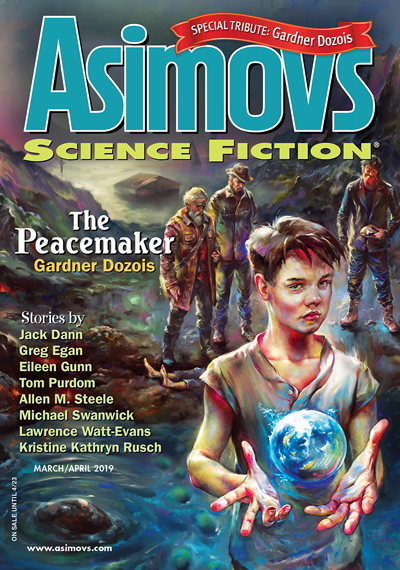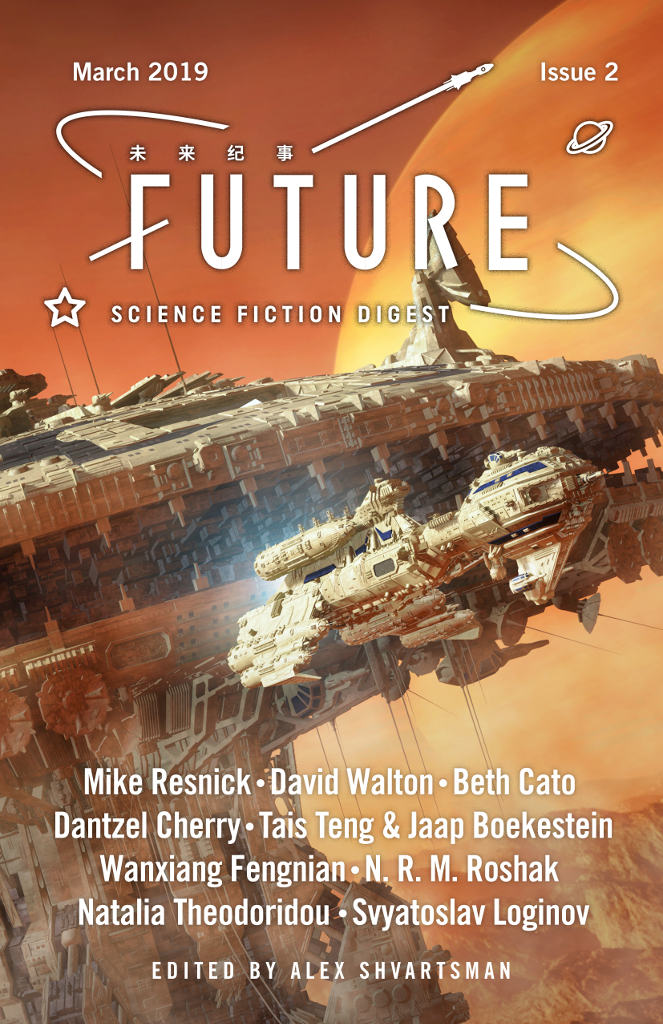Each month, Daniel Haeusser reviews short works of SFT that appear both online and in print. He is an Assistant Professor in the Biology Department at Canisius College, where he teaches microbiology and leads student research projects with bacteria and bacteriophage. He’s also an associate blogger with the American Society for Microbiology’s popular Small Things Considered. Daniel reads broadly in English and French, and his book reviews can be found at Reading1000Lives or Skiffy & Fanty. You can also connect with him on Goodreads or Twitter.
 “The Starry Sky over the Southern Isle” by Zhao Haihong, translated from the Chinese by the author
“The Starry Sky over the Southern Isle” by Zhao Haihong, translated from the Chinese by the author
Asimov’s Science Fiction, Vol. 43, Nos. 3 & 4, March/April 2019
In a future China, where pollution has worsened to block out the sky, a young couple separates so that the wife can take their young daughter into an exclusive self-cleaning domed zone called a ‘Pearl City’. While the wife has changed her career to something desirable for selected entry in the city, the husband refuses to abandon his passion for astronomy, despite its growing impracticability and the scorn it engenders. The pearl city technology is an interesting idea, though the need to see stars thorough telescopes in order to glean scientific data of their study seems incorrect. Ultimately it isn’t about the science, but the perception of what passions are worthwhile, and choices we make to pursue them based on competing factors one might hold dear. The story ends in a touching way that strengthens the father-daughter bonds and gives some hope for the future, but others might find it too saccharine. Note: The author also acknowledges two friends, Bivash and Julian North, for help with translation, and Michael Swanwick for a final ‘polish’ of the text.
 “Meteors” by Clara Ng, translated from the Indonesian by Toni Pollard
“Meteors” by Clara Ng, translated from the Indonesian by Toni Pollard
Words Without Borders, March 2019
An intergalactic alien-human love story that mixes in some humor arising from surprising differences between cultures from the perspective of alien looking at human. The end of the story adds a twist, that interestingly makes one view the rest of the story in a different light. And it turns out that this effect is something uniquely arising from the process of translation. The original Indonesian allows use of gender-neutral terms that become difficult to render in English without having other effects. Thus, a story built around gender fluidity only becomes so in translation through a single reveal at the story’s close, rather than subtly dispersed indications. The essay by the translator that accompanies the story is perhaps even more interesting than the story itself, but nevertheless the story stands on its own.
 “The Lord of Rivers” by Wanxiang Fengnian, translated from the Chinese by Nathan Faries
“The Lord of Rivers” by Wanxiang Fengnian, translated from the Chinese by Nathan Faries
Future Science Fiction Digest, Issue 2, March 2019
The Intelligent Beijing West Station Module monitors the activity and passing of humans through its sector of the city. The AI functions to identify potentially deviant behaviors and to identify/report potential threats to humans while also managing transportation flows to and fro. Dubbed ‘The Lord of Rivers’ by its supervisors and technicians, it also begins to contemplate its own existence and the uniqueness of the humans, both individually and as a collective stream. Interspersed with segments relating the growing experiences of the AI through time are passages set in the far future heat death of the universe, as a species searches for the last bits of energy that may be able to reset existence. A plot where a far future species encounters the remnants of an Earth-derived AI that outlives humanity is familiar, but here it becomes more developed with the AI taken on a custodian role beyond the local to the universal.
“To Save a Human” by Svyatoslav Loginov, translated from the Russian by Max Hrabrov
Future Science Fiction Digest, Issue 2, March 2019
The story is set in a universe where travel between worlds is guided by ‘emitters’, but errors in navigation cause liquids or solids that get in proximity to the technology to rain down onto the surface of a given planet. The narrator of the story, Mowgli, has been raised by a pack of animals on one particular planet, where a capsule carrying a passenger has just crashed in inhospitable terrain. Mowgli follows after an enhanced human-machine Ranger that goes off on a search-and-rescue operation. The world building is well done, and I enjoyed the biology-cybernetic details (and not fully explained details), but I also found this longer story difficult to read due to a lack of structural breaks. There are paragraphs, but no easy line breaks to allow processing before continuing all the way to conclusion. The story concludes with exploration of gender in addition to the theme of family that it begins with through Mowgli’s history. Note: This story will be available online starting 15th May 2019.
![]() “Holes” by Clelia Farris, translated from the Italian by Rachel Cordasco
“Holes” by Clelia Farris, translated from the Italian by Rachel Cordasco
World Literature Today, Spring 2019
This uncannily surreal short story contains a simple plot, but intelligently and subtly delves into the subjects of artificial intelligence, being human, and gender. An advanced computer server existing sometime after humanity’s establishment of colonies on Mars contemplates its functions, the properties of humans, and their relationship to one another. Responding to a cryptic message promising the server ‘what it needs’, the server opens a file that results in the painful insertion of holes into its physical form. Despite the pain, the new holes open the server to new sensations and perspectives, tempting it for more, inching closer to a form with more humanlike senses. The story very effectively captures the sense of machine ‘thought’ transitioning to something more, and makes play with the similarity between the words ‘egg’ and ‘man’ in the original Italian. As a biologist I had some issues with the use of ‘evolution’, but I’m excited to get to talk to the translator about that on our next Skiffy & Fanty podcast!
![]() “Saligia” by H. Pueyo, translated from the Portuguese by the author
“Saligia” by H. Pueyo, translated from the Portuguese by the author
Samovar, March 2019
An acronym for the Latin words for the seven deadly sins, “Saligia” deals with the generational fall-out from the transgressions of an upper-class family in a ‘land between Brazil and Uruguay.” A teen girl is married to a man over twenty years older, but enters into an affair with a caretaker of the estate’s horses. She becomes devastated soon after when the man apparently flees, leaving her with a young child, cursed and marked as a werewolf for being “conceived out of wedlock under the full moon.” However, it soon becomes clear that the real sins in this family do not stem from the woman’s affair and her now despised bastard, but the incestuous depravity, secrets, and lies built around her husband’s siblings that have created all this misfortune. It is a dark story, but also one where the next generation is able to face the truth of their elders and declare ‘enough’ of their evil or indifference to it.
